Monwabisi Kwanda Mbeki is the son of former South African President Thabo Mbeki and Olive Mpahlwa. His disappearance and presumed murder[ further explanation needed ] by SA authorities[ clarify ] has been a matter of international interest. [1]
Monwabisi Kwanda Mbeki is the son of former South African President Thabo Mbeki and Olive Mpahlwa. His disappearance and presumed murder[ further explanation needed ] by SA authorities[ clarify ] has been a matter of international interest. [1]
Monwabisi Kwanda Mbeki known as Kwanda was born to then 16 year old Thabo Mbeki and high school sweetheart Olive Mphahlwa in 1959, in Butterworth, Eastern Cape. Thabo had to by Xhosa law pay a penalty for making an under-age girl pregnant and he gave five head of cattle.
Kwanda lived with Olive's family until the age of ten when he moved in with Thabo's mother Epainette Mbeki (known as Ma Mofokeng) until he passed matric.[ citation needed ]
In 1976, Kwanda went into exile with one of Thabo's old comrades Phindile Mfeti. Kwanda had heard from Phindile that his father was in exile in Swaziland and decided to join him. Kwanda's voice was heard for the last time over a phone when he told Thabo's friend that he was in Durban.
In 1998, both Thabo and Olive spoke at the TRC and found that the last place Kwanda was seen alive was at the ANC military base in Tanzania. It was assumed that both Kwanda and Phindile were killed by the Apartheid government's forces.[ citation needed ]
In 2006, it was announced that a new enquiry was to be launched to try to find out what happened. [1] It was noted that hundreds of bodies of ANC members killed by the authorities of the time have never been located. [2]
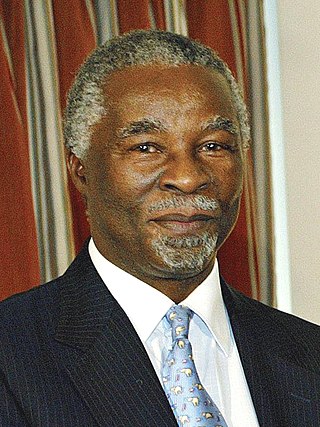
Thabo Mvuyelwa Mbeki is a South African politician who served as the 2nd democratic president of South Africa from 14 June 1999 to 24 September 2008, when he resigned at the request of his party, the African National Congress (ANC). Before that, he was deputy president under Nelson Mandela from 1994 to 1999.
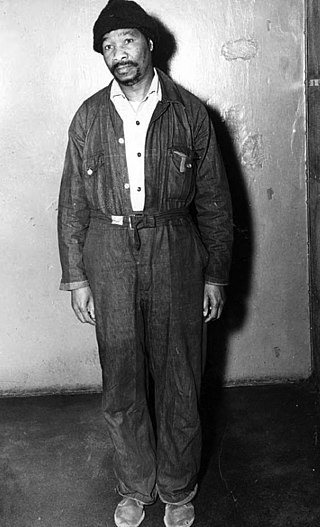
Govan Archibald Mvunyelwa Mbeki was a South African politician, military commander, Communist leader who served as the Secretary of Umkhonto we Sizwe, at its inception in 1961. He was also the son of Chief Sikelewu Mbeki and Johanna Mahala and also the father of the former South African president Thabo Mbeki and political economist Moeletsi Mbeki. He was a leader of the South African Communist Party and the African National Congress. After the Rivonia Trial, he was imprisoned (1963–1987) on charges of terrorism and treason, together with Nelson Mandela, Walter Sisulu, Raymond Mhlaba, Ahmed Kathrada and other eminent ANC leaders, for their role in the ANC's armed wing, Umkhonto we Sizwe (MK). He was sometimes mentioned by his nickname "Oom Gov".
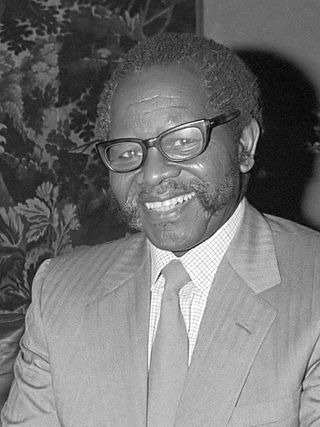
Oliver Reginald Kaizana Tambo was a South African anti-apartheid politician and activist who served as President of the African National Congress (ANC) from 1967 to 1991.
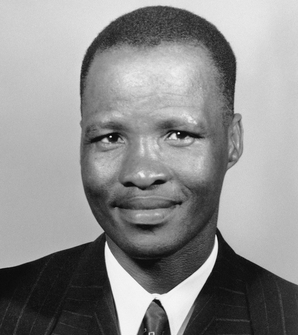
Chief Kaiser Daliwonga Matanzima, often misspelled as Mathanzima, was the long-term leader of Transkei. In 1950, when South Africa was offered to establish the Bantu Authorities Act, Matanzima convinced the Bhunga to accept the Act. The Bhunga were the council of Transkei chiefs, who at first rejected the act until 1955 when Matanzima persuaded them.
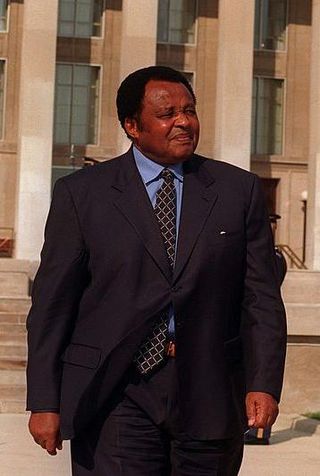
Johannes "Joe" Modise was a South African political figure. He helped to found uMkhonto we Sizwe, the military wing of the African National Congress, and was its longest serving Commander in Chief, deputised at different points in time by Joe Slovo and Chris Hani. Modise headed MK for a 25-year period, from 1965 to 1990. He served as South Africa's first black Minister of Defence from 1994 to 1999 and led the formation of the post-independence defence force.

Nyameko Barney Pityana FKC GCOB is a human rights lawyer and theologian in South Africa. He is an exponent of Black theology.

Mosiuoa Gerard Patrick Lekota is a South African anti-Apartheid revolutionary for the African National Congress (ANC) who served jail time with Nelson Mandela from 1985 and who left the ANC to form the Congress of the People (Cope) splinter party in 2008. He has served as its President since 16 December 2008.
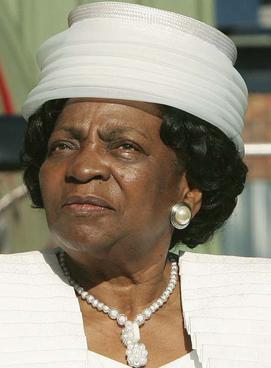
Adelaide Frances Tambo was a South African anti-apartheid activist and former political exile.

Essop Goolam Pahad was a South African politician. He served as the Minister in the Presidency from 1999 to 2008, and was a close ally of Thabo Mbeki.

South Africa since 1994 transitioned from the system of apartheid to one of majority rule. The election of 1994 resulted in a change in government with the African National Congress (ANC) coming to power. The ANC retained power after subsequent elections in 1999, 2004, 2009, 2014, and 2019. Children born during this period are known as the born-free generation, and those aged eighteen or older, were able to vote for the first time in 2014.
Joel Netshitenzhe is a South African politician and strategist, known for his policy and communications work for the African National Congress (ANC). He served as head of communications under President Nelson Mandela (1994); head of Government Communication and Information System (1998–2006); and head of the policy unit in the Presidency (2001–2009) under Presidents Thabo Mbeki and Jacob Zuma, though he was viewed as a particularly close ally of Mbeki's. A former anti-apartheid activist, Netshitenzhe was a member of the ANC National Executive Committee between 1991 and 2022, and he was a member of the ANC's delegation to the negotiations that ended apartheid.
The 52nd National Conference of the African National Congress (ANC) was held in Polokwane, Limpopo, from 16 to 20 December 2007. At the conference, Jacob Zuma and his supporters were elected to the party's top leadership and National Executive Committee (NEC), dealing a significant defeat to national President Thabo Mbeki, who had sought a third term in the ANC presidency. The conference was a precursor to the general election of 2009, which the ANC was extremely likely to win and which did indeed lead to Zuma's ascension to the presidency of South Africa. Mbeki was prohibited from serving a third term as national President but, if re-elected ANC President, could likely have leveraged that office to select his successor.

Moeletsi Goduka Mbeki is a South African political economist and the deputy chairman of the South African Institute of International Affairs, an independent think tank based at the University of the Witwatersrand, and a political analyst for Nedcor Bank. He is a member of the executive council of the International Institute for Strategic Studies (IISS) which is based in London. He is the younger brother of former President Thabo Mbeki and son of ANC leader Govan Mbeki. He has been a frequent critic of President Mbeki.

The African National Congress (ANC) has been the governing party of the Republic of South Africa since 1994. The ANC was founded on 8 January 1912 in Bloemfontein and is the oldest liberation movement in Africa.

The Congress of the People (COPE) is a South African political party formed in 2008 by former members of the African National Congress (ANC). The party was founded by former ANC members Mosiuoa Lekota, Mbhazima Shilowa and Mluleki George to contest the 2009 general election. The party was announced following a national convention held in Sandton on 1 November 2008, and was founded at a congress held in Bloemfontein on 16 December 2008. The name echoes the 1955 Congress of the People at which the Freedom Charter was adopted by the ANC and other parties, a name strongly contested by the ANC in a legal move dismissed by the Pretoria High Court.
Vusumzi "Vusi" Pikoli is a South African advocate and the former head of South Africa's National Prosecuting Authority. He is noted for instigating criminal charges against disgraced South African police commissioner Jackie Selebi and ANC president Jacob Zuma. In 2008 he was suspended from his duties by President Thabo Mbeki, a close confidant of Selebi, and then subsequently fired by Mbeki's successor, Kgalema Motlanthe, who is an ally of Zuma. As such, opposition parties and sections of the press have claimed Pikoli is the victim of two separate political conspiracies. In October 2014 Pikoli was appointed as the Western Cape's first police ombudsman by Premier Helen Zille, whose choice was unanimously backed by the provincial legislature's standing committee on community safety.
Steve Vukhile Tshwete was a South African politician and activist with the African National Congress. Involved in Umkhonto we Sizwe, Tshwete was imprisoned by the apartheid authorities on Robben Island from February 1964 to 1978. Tshwete resumed activities with the ANC and become a regional coordinator for the new United Democratic Front. He later lived in exile in Zambia. After the first free elections in South Africa in 1994, he became the new government's first Sports Minister and later was Minister of Safety and Security.

Ahmed Timol was an anti-apartheid activist in the underground South African Communist Party. He died at the age of 29 from injuries sustained when he fell from the top floor of John Vorster Square police station in Johannesburg. Police claimed, and an official inquest confirmed, that Timol had committed suicide by jumping out the window. The claim was widely disbelieved in anti-apartheid circles, and in the movement Timol's death became symbolic of the broader phenomenon of deaths in police custody, as well as of the abuses and dishonesty of the apartheid state.

Devikarani Priscilla Sewpal Jana was a South African human rights lawyer, politician and diplomat. As a member of the African National Congress (ANC) during the anti-apartheid movement, she participated in both legal activism as well as in the underground movement to end apartheid. She represented many significant figures in the movement, including South African president Nelson Mandela, Winnie Madikizela-Mandela, Steve Biko, Govan Mbeki, Walter Sisulu, and Archbishop Desmond Tutu. Jana was one of the very few South Africans who had access to political prisoners, including Mandela, in the maximum security Robben Island prison, and served as an emissary for coded messages between the political prisoners and the ANC leadership.

Johnstone Mfanafuthi Makatini, also spelled Makathini or Makhathini, was a South African politician and anti-apartheid activist. A longstanding diplomatic representative for the African National Congress (ANC), he was the head of the ANC's Department of International Affairs from 1983 until his death in exile in 1988.
This article needs additional or more specific categories .(April 2022) |